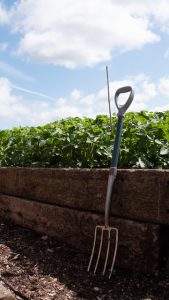Tips for a Beginner Gardener
There are so many reasons to get gardening, from that fresh air and vitamin D boost by being outdoors, to the alleviation of stress and anxiety that comes from relaxing and taking some time out to clear your mind. Plus, at the end, your hard work and persistence results in a beautiful garden to enjoy – and that sense of achievement is satisfying! But figuring out where to start as a first-time gardener can be a little overwhelming. There are lots of things think about, from the soil type to the amount of sun or shade your garden gets.
Sandra, owner of a Kent garden centre shares her expertise on how to begin as a gardener. Whether you have a spacious back garden, or a very small patio, these tips should help you make a start.

First Things First
The first thing to think about is what you want to do with your garden. Do you want a flower patch, a wildflower garden, or just a few flowerpots to brighten your balcony? For a small garden, patio or balcony, growing plants in containers could be a great option. Plant pots need drainage so that soil doesn’t get waterlogged. If you can’t use a pot with a hole in the bottom, line the bottom of the pot with stones to allow the water to drain.
Not all plants will be happy in your garden. If you want to grow plants in the ground, but you aren’t sure about what might grow best, have a look in your neighbour’s garden and see what sorts of things are thriving. This can be a good way to get to know your neighbours and they might have some great advice! It is possible to improve your soil so that different plants can grow, for example using mulch or top soil, but this takes time and patience.

Some plants grow better in a sunny space, whereas others thrive in the shade. Try doing some research into what might work in your garden or read the plant labels for some basic info! You can check the height of plants, when they flower and what conditions suit them best.
Do you have pets? Some plants may be toxic to animals, such as azaleas and lilies, so do a little research before deciding what to buy.
Ready, Get Set, Grow!

To make the first step to becoming a gardener, it is probably helpful to buy a few tools depending on what size garden you have, such a spade, a rake and some durable gloves. Then you are good to go!
Take a trip to your local garden centre and buy a few plants to start. A top tip is to plant them before they flower, which gives them time to become established (when they begin to produce new growth) before flowering.
Once planted, water well until established. It’s best to water early in the morning or late in the evening so that the water can be absorbed and won’t just evaporate in the heat of the day, particularly in the summer. Make sure you are watering the roots of the plants as opposed to the leaves. Spring and autumn are good times to plant up your garden to make the most of the rainfall.
Gardening is about trial and error. You will plant things that won’t flourish in your soil and lose them. Don’t be put off, just try again. It’s a great idea to start small and concentrate on one area at a time.
Finally, make time for your garden. Things will change very quickly, so make the most of it. Be sure to sit in your garden and enjoy your efforts on a warm, sunny evening!

Garden Sustainably
Here are a few things you can do in your garden to benefit the environment:
- Invest in a water butt to catch the rain. This not only saves water, but plants tend to grow better in natural rainwater.
- You could consider composting your garden and food waste.
- Use old yogurt pots and containers from your kitchen to start your seeds off.
- Use your washing up water to water the garden in dry periods.
- It has been found that some weeds, such as creeping buttercup, poppies and thistles, are even higher in nectar and pollen than other garden plants – so consider keeping a patch of weeds and wildflowers to attract the bees. Not only will this help to pollenate your garden, but it will help support the bee population.
“It’s proven that plants and gardening have a positive effect on our mental health and happiness. They uplift us, they heal us and they bring us closer to nature. They attract life and offer hope, we could all do with more of that right now.”Alan Titchmarsh,
Professional gardener, journalist & media personality
Find out more about gardening:
Tons of tips, pots of info on plants and stunning gardens to visit:
Royal Horticultural Society (RHS)
